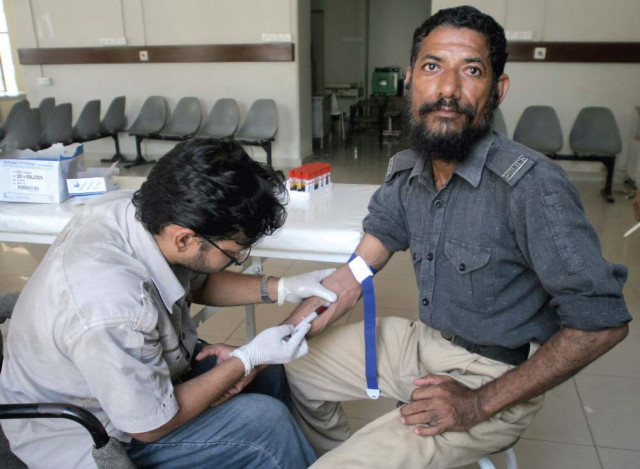Wipe it out: Number of new hepatitis cases on the rise
More cold storage units are needed for vaccines across the province, says expert.

Building immunity: 6.7m people have been vaccinated against hepatitis under the Hepatitis Control Programme in Sindh. PHOTOS: EXPRESS/FILE
In recent times, the programme has stepped up its game to keep a check on the disease. A total of 1,446 screening camps were established last year alone. Just under one million people have been screened for the disease in Sindh. About 6.7 million people living in the province have also been inoculated against the disease.
Over the past three years, new molecular labs have been established at Civil Hospital, Mirpurkhas, Chandka Medical College, Larkana, and Ghulam Mohammad Mahar Medical College, Sukkur. While talking to The Express Tribune, Dr Memon said, “These labs cover the most populated areas of the province. Screening will help prevent the spread of the disease.”
Dr Memon added that despite all of this, greater effort is required to prevent new cases. The programme he is working for is slated to end in 2014, but the incidence of hepatitis B and C is steadily rising across Pakistan. Though there is no exact figure of the number of people infected, rough estimates place the number of people in Sindh with hepatitis B at one million and hepatitis C at two million. The number of infections is on the rise across all age groups. Globally, around 600,000 people die every year because of hepatitis B, while hepatitis C claims around 350,000 lives.

Dr Memon said that there is a need to improve the availability and storage of vaccines across the province. A lack of cold storage can make it difficult to store vaccines and subsequently drives to inoculate people. He added that five cold storage chains have been established in the province - three in Hyderabad and one each in Larkana and Khairpur.
How it spreads
Hepatitis A is usually seen in children and Hepatitis E in adolescents. Both spread through contaminated food and water. Hepatitis A and E viruses are self-limiting and settle within a few days to a few weeks. Major risk factors include sharing of needles or blades, transfusion of unscreened blood and unsafe sexual practices. The disease can also be transferred from an infected mother to her newborn.
Published in The Express Tribune, February 19th, 2013.



















COMMENTS
Comments are moderated and generally will be posted if they are on-topic and not abusive.
For more information, please see our Comments FAQ